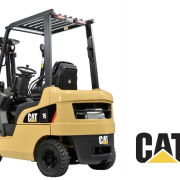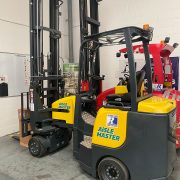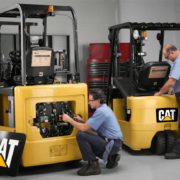Archive for year: 2024
Essential Annual Maintenance for Forklifts: Ensuring Compliance with UK Standards
/in Maintenance /by radnessadminForklifts are integral to material handling operations across industries in the UK, and their proper maintenance is crucial for safety and efficiency. Adhering to annual maintenance routines not only keeps forklifts running smoothly but also ensures compliance with UK standards and regulations.
Let’s explore the essential aspects of annual maintenance for forklifts, so you can make sure your fleet is compliant. We also offer servicing contracts and maintenance, so get in touch to chat to our friendly team about how we can help keep your fleet running.
Recognizing the Significance of Annual Maintenance
– Forklifts in the UK undergo significant wear and tear due to heavy usage, making regular maintenance essential.
– Proper maintenance reduces the risk of breakdowns, thereby enhancing productivity and safety in the workplace.
– Annual maintenance helps identify potential safety hazards and ensures compliance with UK regulations, fostering a safer working environment.
– It also contributes to extending the lifespan of forklifts, ultimately reducing operational costs for businesses.
Key Components of Annual Maintenance
a. Thorough Inspection: A comprehensive inspection of the forklift’s components is conducted to identify any signs of wear, damage, or malfunction.
b. Fluid Checks: Fluid levels such as hydraulic fluid, coolant, and oil are checked and replenished as required, ensuring optimal performance.
c. Battery Maintenance: For electric forklifts, battery performance and electrolyte levels are inspected and maintained according to UK standards.
d. Tire Inspection: Tire pressure, tread wear, and overall condition are assessed to ensure adequate traction and stability, in line with UK guidelines.
e. Brake System: Brake pads, hydraulic lines, and brake fluid are inspected for wear and leaks, complying with UK safety regulations.
f. Steering and Suspension: Steering components and suspension systems are checked to ensure proper functioning and alignment, meeting UK standards.
g. Safety Features: Lights, alarms, horns, and other safety features are tested to ensure compliance with UK regulations and standards.
h. Documentation: Detailed records of maintenance activities are maintained in accordance with UK standards, providing a record of compliance and reference for future inspections.
Compliance with UK Standards
a. HSE Regulations: The Health and Safety Executive (HSE) sets forth regulations for forklift maintenance to promote workplace safety in the UK.
b. British Standards (BS): Compliance with relevant British Standards (BS) pertaining to forklift design, construction, and maintenance is essential for ensuring safety and quality.
c. Manufacturer Recommendations: Following the maintenance recommendations provided by forklift manufacturers is critical for maintaining warranty coverage and optimal performance while meeting UK standards.
d. Industry Best Practices: Many industries in the UK have established their own best practices and guidelines for forklift maintenance based on specific operational needs and safety requirements.
Importance of Professional Maintenance Services
– While some maintenance tasks can be performed by in-house technicians, certain inspections and repairs require specialized training and equipment.
– Engaging professional maintenance services ensures that forklifts are thoroughly inspected and serviced according to UK standards and regulations.
– Regular professional maintenance helps identify potential issues early, preventing costly breakdowns and downtime, thereby promoting workplace safety and productivity.
Adhering to annual maintenance routines in accordance with UK standards and regulations is imperative for ensuring the safety, efficiency, and longevity of forklifts in the workplace. If you’re looking to work with a company that specialises in keeping forklift fleets running, then get in touch with our team here at Radnes today and find out how we can help you.
Navigating the Future: Adapting Forklift Fleets for Success
/in Forklift Trucks /by radnessadminThe logistics industry stands at the precipice of significant transformation as we enter 2024, and making sure your forklift fleet is keeping up is key. With advancements in technology, shifting consumer expectations, and global challenges such as climate change, companies must adapt swiftly to stay competitive. One crucial aspect of this adaptation is optimizing forklift fleets to meet the demands of the evolving landscape.
Emerging Trends Shaping the Logistics Industry in 2024
1. Automation and Robotics: Automation continues to revolutionize the logistics sector, with robotics playing a pivotal role in warehouse operations. In 2024, we can expect to see a further integration of autonomous forklifts and warehouse robots, streamlining processes and enhancing efficiency.
2. Sustainability and Green Initiatives: Environmental sustainability has become a priority for companies worldwide. In the logistics industry, this translates to the adoption of eco-friendly practices, including electric forklifts, renewable energy sources, and optimized routes to reduce carbon emissions.
3. Data Analytics and IoT Integration: Data-driven decision-making will be ubiquitous in 2024, with logistics companies leveraging advanced analytics and Internet of Things (IoT) technology to optimize supply chain operations. Forklifts equipped with sensors and connected to centralized platforms will provide real-time insights, enabling proactive maintenance and route optimization.
4. Last-Mile Delivery Innovations: The last mile remains a critical and challenging aspect of logistics. Companies are exploring innovative solutions such as drones, electric delivery vehicles, and micro-fulfillment centers to enhance efficiency and meet the growing demands of e-commerce customers.
Adapting Forklift Fleets for Success in 2024
1. Invest in Electric Forklifts: With an increasing emphasis on sustainability, transitioning to electric forklifts can offer numerous benefits. Not only do they produce zero emissions, but they also tend to have lower operating costs and require less maintenance compared to traditional diesel or gas-powered forklifts.
2. Embrace Automation: Incorporating autonomous forklifts into your fleet can significantly improve efficiency and safety in warehouse operations. These robots can handle repetitive tasks, navigate complex environments, and work alongside human operators, freeing up valuable time and resources.
3. Implement Predictive Maintenance: Leveraging IoT technology, implement predictive maintenance strategies for your forklift fleet. By monitoring key performance indicators and utilizing data analytics, you can identify potential issues before they escalate, reducing downtime and optimizing equipment lifespan.
4. Employee Training and Upskilling: As technology continues to reshape the logistics industry, investing in employee forklift training and upskilling is crucial. Equip your workforce with the necessary skills to operate and maintain advanced forklift technologies effectively, ensuring smooth transition and maximum productivity.
5. Collaborate with Technology Partners: Partnering with technology providers and industry experts can provide invaluable insights and support in navigating the complexities of fleet optimization. Stay abreast of the latest advancements and collaborate with partners to tailor solutions that align with your specific operational needs.
Whatever you are doing to make sure your business is ready for 2024, we are right their with you to help you out. Find out more about how we can work with you to make sure you have the forklifts you need for your logistics business and chat to our friendly team today.
FIND US

Radnes Services Ltd
Unit E16
Imperial Way
Croydon
Surrey CR0 4RR
CONTACT US
t: 0800 195 9831
e: sales@radnes.com
Open
Monday – Friday – 7am till 5pm
Closed
Saturday & Sunday
Call before 3.30 pm for next day hire and delivery





